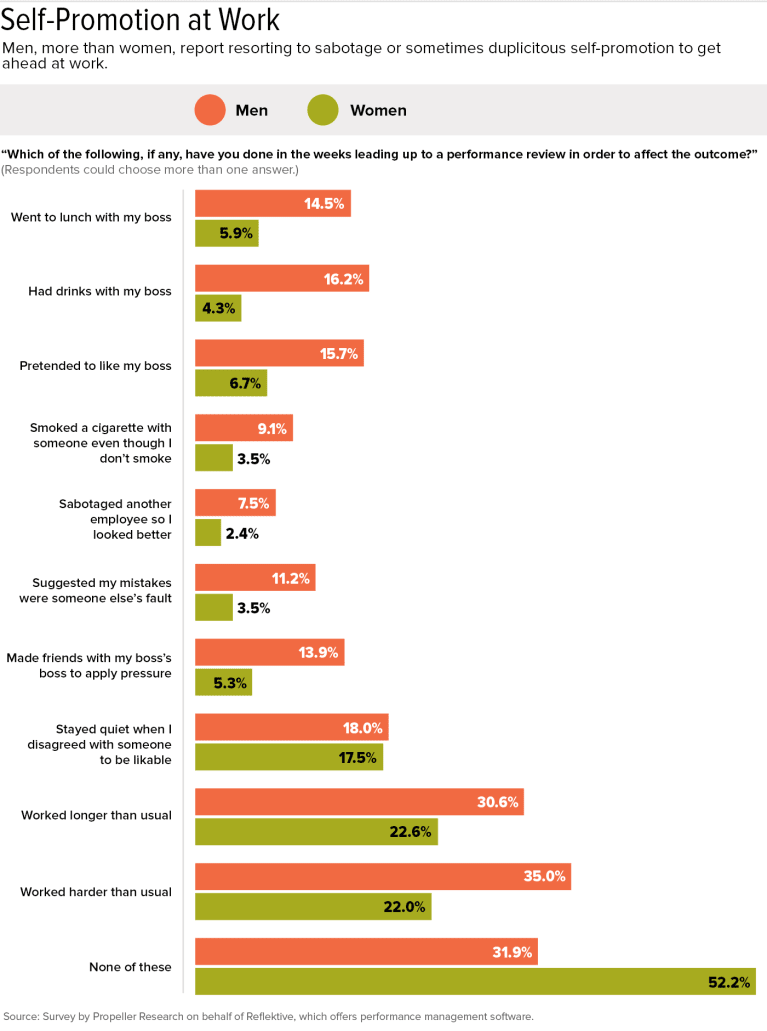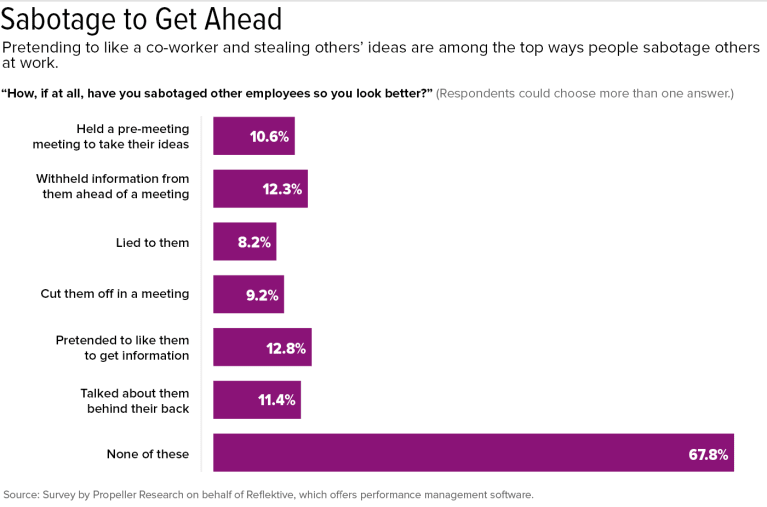What to Do When You Get Sabotage on a Performance Review
There are a few ways to succeed at your visitor.
You can piece of work hard, evidence initiative, and exist reliable and trustworthy.
Or you can make others wait bad and cozy up to your dominate.
Managers are more than twice as likely to sabotage others and so they wait better at work. Men, more than than women, resort to sabotage or duplicitous self-promotion to become alee. And pretending to like a dominate or co-worker and stealing others' ideas are among the most popular of the insincere tactics people employ for getting ahead.
That's according to a survey of one,000 full-fourth dimension employees conducted in July 2019 by Propeller Research on behalf of Reflektive, a people direction platform based in Boston and San Francisco.
"The degree and frequency of deliberate demolition at work is concerning but enlightening," said Rachel Ernst, Reflektive's vice president of employee success. "People, managers included, are homo and therefore fallible."

Motivations for Sabotage
What are the top tactics for sabotaging others at work? Co-ordinate to the survey, pretending to like a co-worker to get information, meeting with a co-worker earlier a larger meeting to steal his or her ideas, and withholding of import data from a colleague ahead of a meeting.
Withholding information amounts to demolition because "anyone presenting without the same level of knowledge about the topic at hand would be handicapped, would exist vulnerable, [would] look foolish and underinformed," said David Lewis, president and CEO of OperationsInc, an HR outsourcing and consulting company in Norwalk, Conn.
Motivations for sabotage can exist competition, ambition or revenge, said Lewis, who has his own experience with sabotage.
"I worked in a house early in my career where the founder and CEO was retiring and decided to not select his successor, leaving a ability vacuum for those in the C-suite to sort out," Lewis recalled. "Iv candidates emerged, and each, in an effort to win the CEO part, undercut the others in some fashion."
Roberta Chinsky Matuson is president of Human Resources Solutions in Northampton, Mass., and author of Of a sudden in Charge (Nicholas Brealey Publishing, 2011). She has experience with sabotage, too.
"Most organizations I've been in or that I work with, they're highly politically charged," she said, "and to move up, yous have to make sure plays, and non everybody plays nicely."
[SHRM members-only toolkit: Introduction to the Human Resources Subject of Ethics and Corporate Social Responsibleness and Sustainability ]
Cozying Upwards to the Dominate
Men are iii to four times more than probable than women to sabotage a colleague leading upwards to a performance review, the survey institute.
"Information technology is difficult to say why men are more probable than women to undermine colleagues for their own advantage," Ernst said.
Chinsky Matuson isn't sure she buys that men sabotage work colleagues more than women.
"I've seen a lot of women demolition their co-workers," she said.
Asked what things they'd done in the weeks leading up to a functioning review to affect the outcome, many survey respondents said they pretended to similar their boss when they didn't, went to dejeuner or had drinks with their boss, suggested their mistakes were someone else'due south fault, or worked longer and harder than usual.
But lest anyone feel sorry for the duped managing director, know that managers are more than twice as likely to sabotage a colleague in order to await better, the survey found.
The most common demolition tactics among managers:
- Talking about a colleague behind his or her dorsum: 26 per centum of managers surveyed admitted doing this, compared with 14 percent of employees.
- Withholding data ahead of a meeting: 18 percent of the managers polled said they'd done this, compared with 7 per centum of employees.
- Property a pre-meeting to steal a colleague'southward ideas: 16 percent of managers claimed to have used this tactic, compared with 5 percent of employees.
Equally an executive coach, Chinsky Matuson has had clients confess the things they've washed to sabotage others.
"As you lot move up in the organisation, there are fewer and fewer spots that y'all're competing for," she said. "So if you want to get one of those spots, you lot take to be a little more than cutthroat."

Source: https://www.shrm.org/resourcesandtools/hr-topics/employee-relations/pages/sabotage-at-work-.aspx